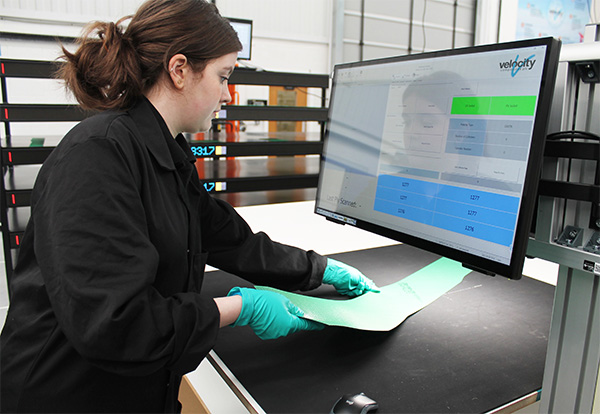Velocity Composites launches digital manufacturing cell to improve material efficiency
Leading aerospace supplier Velocity Composites has launched a new digital manufacturing cell designed to help improve traceability and efficiency for customers.
The cell, located at Velocity Composites’ headquarters in Burnley, Lancashire, creates a process where all composite plies can be scanned, logged and sequenced efficiently to improve traceability and reduce costs.
Matthew Fisher, Product and Process Manager at Velocity Composites, said: “We aim to be at the forefront of Industry 4.0 technologies to improve the aerospace supply chain, helping customers to cut waste, become more efficient and save money.
“Our Digital Manufacturing Cell is the next step in our journey to improve even further. Our bespoke AVISoCS technology can help customers to fully trace each individual piece of ply within a job, as it is nested, cut and sequenced ready to be delivered.
“Within our own processes, we pride ourselves on minimal waste and ultimate efficiency, and the Digital Manufacturing Cell allows us to optimise our workflow so each job is managed flexibly and can provide greater value to the customer.”
The cell is the latest in a range of data-driven technology advances at Velocity Composites, aimed at fully tracking and tracing the aerospace supply chain for customers, improving efficiencies and making savings on material and operational costs.
Velocity’s own VRP technology has been designed to manage the entire value stream, from customer demand management, raw material management, batch traceability, complex nesting, kit manufacture and kit logistics, with all areas being connected and sharing real time data to drive maximum efficiencies.
Matthew Fisher added: “The software allows clients to benefit from real-time data which helps with Enterprise Resource Planning to optimise operations, cut down on waste and provide sound information upon which to make decisions.
“Customers can have a real time view of jobs from their initial acceptance and planning, through every step before it is delivered. The basic technology is similar to what people would experience when tracking a postage delivery or ordering a takeaway, but we have specifically tailored it to our processes in composite manufacturing to add that value to the aerospace and related sectors.”
As a result of the company’s proprietary software, Velocity’s customers have been able to reduce material waste by up to 20 per cent, while also creating operational, stock and process efficiencies in a way which supports staff to be more effective.
The savings not only help companies to become more efficient and competitive but can help mitigate the impact of rising material costs while closing the gap on achieving environmental targets for the aerospace sector which stand at 15 per cent by 2030, 40 per cent by 2040, and achieving net zero by 2050.






